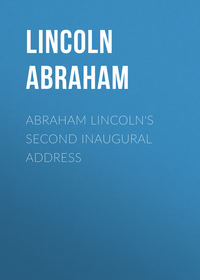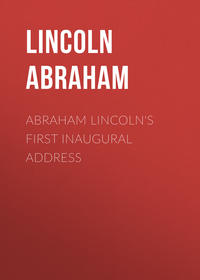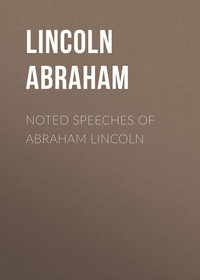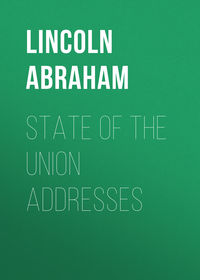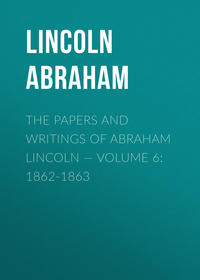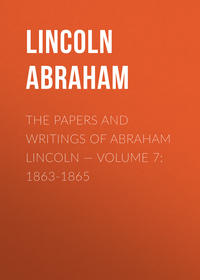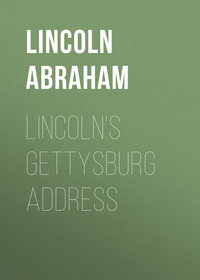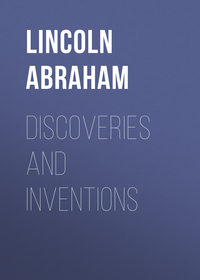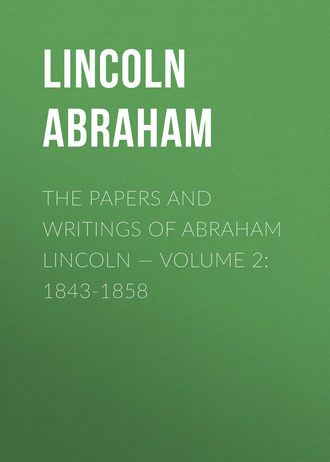 полная версия
полная версияThe Papers And Writings Of Abraham Lincoln — Volume 2: 1843-1858
Mr. Clay's predominant sentiment, from first to last, was a deep devotion to the cause of human liberty — a strong sympathy with the oppressed everywhere, and an ardent wish for their elevation. With him this was a primary and all-controlling passion. Subsidiary to this was the conduct of his whole life. He loved his country partly because it was his own country, and mostly because it was a free country; and he burned with a zeal for its advancement, prosperity, and glory, because he saw in such the advancement, prosperity, and glory of human liberty, human right, and human nature. He desired the prosperity of his countrymen, partly because they were his countrymen, but chiefly to show to the world that free men could be prosperous.
That his views and measures were always the wisest needs not to be affirmed; nor should it be on this occasion, where so many thinking differently join in doing honor to his memory. A free people in times of peace and quiet when pressed by no common danger-naturally divide into parties. At such times the man who is of neither party is not, cannot be, of any consequence. Mr. Clay therefore was of a party. Taking a prominent part, as he did, in all the great political questions of his country for the last half century, the wisdom of his course on many is doubted and denied by a large portion of his countrymen; and of such it is not now proper to speak particularly. But there are many others, about his course upon which there is little or no disagreement amongst intelligent and patriotic Americans. Of these last are the War of 1812, the Missouri question, nullification, and the now recent compromise measures. In 1812 Mr. Clay, though not unknown, was still a young man. Whether we should go to war with Great Britain being the question of the day, a minority opposed the declaration of war by Congress, while the majority, though apparently inclined to war, had for years wavered, and hesitated to act decisively. Meanwhile British aggressions multiplied, and grew more daring and aggravated. By Mr. Clay more than any other man the struggle was brought to a decision in Congress. The question, being now fully before Congress, came up in a variety of ways in rapid succession, on most of which occasions Mr. Clay spoke. Adding to all the logic of which the subject was susceptible that noble inspiration which came to him as it came to no other, he aroused and nerved and inspired his friends, and confounded and bore down all opposition. Several of his speeches on these occasions were reported and are still extant, but the best of them all never was. During its delivery the reporters forgot their vocation, dropped their pens, and sat enchanted from near the beginning to quite the close. The speech now lives only in the memory of a few old men, and the enthusiasm with which they cherish their recollection of it is absolutely astonishing. The precise language of this speech we shall never know; but we do know we cannot help knowing — that with deep pathos it pleaded the cause of the injured sailor, that it invoked the genius of the Revolution, that it apostrophized the names of Otis, of Henry, and of Washington, that it appealed to the interests, the pride, the honor, and the glory of the nation, that it shamed and taunted the timidity of friends, that it scorned and scouted and withered the temerity of domestic foes, that it bearded and defied the British lion, and, rising and swelling and maddening in its course, it sounded the onset, till the charge, the shock, the steady struggle, and the glorious victory all passed in vivid review before the entranced hearers.
Important and exciting as was the war question of 1812, it never so alarmed the sagacious statesmen of the country for the safety of the Republic as afterward did the Missouri question. This sprang from that unfortunate source of discord — negro slavery. When our Federal Constitution was adopted, we owned no territory beyond the limits or ownership of the States, except the territory northwest of the River Ohio and east of the Mississippi. What has since been formed into the States of Maine, Kentucky and Tennessee, was, I believe, within the limits of or owned by Massachusetts, Virginia, and North Carolina. As to the Northwestern Territory, provision had been made even before the adoption of the Constitution that slavery should never go there. On the admission of States into the Union, carved from the territory we owned before the Constitution, no question, or at most no considerable question, arose about slavery — those which were within the limits of or owned by the old States following respectively the condition of the parent State, and those within the Northwest Territory following the previously made provision. But in 1803 we purchased Louisiana of the French, and it included with much more what has since been formed into the State of Missouri. With regard to it, nothing had been done to forestall the question of slavery. When, therefore, in 1819, Missouri, having formed a State constitution without excluding slavery, and with slavery already actually existing within its limits, knocked at the door of the Union for admission, almost the entire representation of the non-slaveholding States objected. A fearful and angry struggle instantly followed. This alarmed thinking men more than any previous question, because, unlike all the former, it divided the country by geographical lines. Other questions had their opposing partisans in all localities of the country and in almost every family, so that no division of the Union could follow such without a separation of friends to quite as great an extent as that of opponents. Not so with the Missouri question. On this a geographical line could be traced, which in the main would separate opponents only. This was the danger. Mr. Jefferson, then in retirement, wrote:
"I had for a long time ceased to read newspapers or to pay any attention to public affairs, confident they were in good hands and content to be a passenger in our bark to the shore from which I am not distant. But this momentous question, like a firebell in the night, awakened and filled me with terror. I considered it at once as the knell of the Union. It is hushed, indeed, for the moment. But this is a reprieve only, not a final sentence. A geographical line coinciding with a marked principle, moral and political, once conceived and held up to the angry passions of men, will never be obliterated, and every irritation will mark it deeper and deeper. I can say with conscious truth that there is not a man on earth who would sacrifice more than I would to relieve us from this heavy reproach in any practicable way.
"The cession of that kind of property — for it is so misnamed — is a bagatelle which would not cost me a second thought if in that way a general emancipation and expatriation could be effected, and gradually and with due sacrifices I think it might be. But as it is, we have the wolf by the ears, and we can neither hold him nor safely let him go. Justice is in one scale, and self-preservation in the other."
Mr. Clay was in Congress, and, perceiving the danger, at once engaged his whole energies to avert it. It began, as I have said, in 1819; and it did not terminate till 1821. Missouri would not yield the point; and Congress that is, a majority in Congress — by repeated votes showed a determination not to admit the State unless it should yield. After several failures, and great labor on the part of Mr. Clay to so present the question that a majority could consent to the admission, it was by a vote rejected, and, as all seemed to think, finally. A sullen gloom hung over the nation. All felt that the rejection of Missouri was equivalent to a dissolution of the Union, because those States which already had what Missouri was rejected for refusing to relinquish would go with Missouri. All deprecated and deplored this, but none saw how to avert it. For the judgment of members to be convinced of the necessity of yielding was not the whole difficulty; each had a constituency to meet and to answer to. Mr. Clay, though worn down and exhausted, was appealed to by members to renew his efforts at compromise. He did so, and by some judicious modifications of his plan, coupled with laborious efforts with individual members and his own overmastering eloquence upon that floor, he finally secured the admission of the State. Brightly and captivating as it had previously shown, it was now perceived that his great eloquence was a mere embellishment, or at most but a helping hand to his inventive genius and his devotion to his country in the day of her extreme peril.
After the settlement of the Missouri question, although a portion of the American people have differed with Mr. Clay, and a majority even appear generally to have been opposed to him on questions of ordinary administration, he seems constantly to have been regarded by all as the man for the crisis. Accordingly, in the days of nullification, and more recently in the reappearance of the slavery question connected with our territory newly acquired of Mexico, the task of devising a mode of adjustment seems to have been cast upon Mr. Clay by common consent — and his performance of the task in each case was little else than a literal fulfilment of the public expectation.
Mr. Clay's efforts in behalf of the South Americans, and afterward in behalf of the Greeks, in the times of their respective struggles for civil liberty, are among the finest on record, upon the noblest of all themes, and bear ample corroboration of what I have said was his ruling passion — a love of liberty and right, unselfishly, and for their own sakes.
Having been led to allude to domestic slavery so frequently already, I am unwilling to close without referring more particularly to Mr. Clay's views and conduct in regard to it. He ever was on principle and in feeling opposed to slavery. The very earliest, and one of the latest, public efforts of his life, separated by a period of more than fifty years, were both made in favor of gradual emancipation. He did not perceive that on a question of human right the negroes were to be excepted from the human race. And yet Mr. Clay was the owner of slaves. Cast into life when slavery was already widely spread and deeply seated, he did not perceive, as I think no wise man has perceived, how it could be at once eradicated without producing a greater evil even to the cause of human liberty itself. His feeling and his judgment, therefore, ever led him to oppose both extremes of opinion on the subject. Those who would shiver into fragments the Union of these States, tear to tatters its now venerated Constitution, and even burn the last copy of the Bible, rather than slavery should continue a single hour, together with all their more halting sympathizers, have received, and are receiving, their just execration; and the name and opinions and influence of Mr. Clay are fully and, as I trust, effectually and enduringly arrayed against them. But I would also, if I could, array his name, opinions, and influence against the opposite extreme — against a few but an increasing number of men who, for the sake of perpetuating slavery, are beginning to assail and to ridicule the white man's charter of freedom, the declaration that "all men are created free and equal." So far as I have learned, the first American of any note to do or attempt this was the late John C. Calhoun; and if I mistake not, it soon after found its way into some of the messages of the Governor of South Carolina. We, however, look for and are not much shocked by political eccentricities and heresies in South Carolina. But only last year I saw with astonishment what purported to be a letter of a very distinguished and influential clergyman of Virginia, copied, with apparent approbation, into a St. Louis newspaper, containing the following to me very unsatisfactory language:
"I am fully aware that there is a text in some Bibles that is not in mine. Professional abolitionists have made more use of it than of any passage in the Bible. It came, however, as I trace it, from Saint Voltaire, and was baptized by Thomas Jefferson, and since almost universally regarded as canonical authority`All men are born free and equal.'
"This is a genuine coin in the political currency of our generation. I am sorry to say that I have never seen two men of whom it is true. But I must admit I never saw the Siamese Twins, and therefore will not dogmatically say that no man ever saw a proof of this sage aphorism."
This sounds strangely in republican America. The like was not heard in the fresher days of the republic. Let us contrast with it the language of that truly national man whose life and death we now commemorate and lament: I quote from a speech of Mr. Clay delivered before the American Colonization Society in 1827:
"We are reproached with doing mischief by the agitation of this question. The society goes into no household to disturb its domestic tranquillity. It addresses itself to no slaves to weaken their obligations of obedience. It seeks to affect no man's property. It neither has the power nor the will to affect the property of any one contrary to his consent. The execution of its scheme would augment instead of diminishing the value of property left behind. The society, composed of free men, conceals itself only with the free. Collateral consequences we are not responsible for. It is not this society which has produced the great moral revolution which the age exhibits. What would they who thus reproach us have done? If they would repress all tendencies toward liberty and ultimate emancipation, they must do more than put down the benevolent efforts of this society. They must go back to the era of our liberty and independence, and muzzle the cannon which thunders its annual joyous return. They must renew the slave trade, with all its train of atrocities. They must suppress the workings of British philanthropy, seeking to meliorate the condition of the unfortunate West Indian slave. They must arrest the career of South American deliverance from thraldom. They must blow out the moral lights around us and extinguish that greatest torch of all which America presents to a benighted world — pointing the way to their rights, their liberties, and their happiness. And when they have achieved all those purposes their work will be yet incomplete. They must penetrate the human soul, and eradicate the light of reason and the love of liberty. Then, and not till then, when universal darkness and despair prevail, can you perpetuate slavery and repress all sympathy and all humane and benevolent efforts among free men in behalf of the unhappy portion of our race doomed to bondage."
The American Colonization Society was organized in 1816. Mr. Clay, though not its projector, was one of its earliest members; and he died, as for many preceding years he had been, its president. It was one of the most cherished objects of his direct care and consideration, and the association of his name with it has probably been its very greatest collateral support. He considered it no demerit in the society that it tended to relieve the slave-holders from the troublesome presence of the free negroes; but this was far from being its whole merit in his estimation. In the same speech from which we have quoted he says:
"There is a moral fitness in the idea of returning to Africa her children, whose ancestors have been torn from her by the ruthless hand of fraud and violence. Transplanted in a foreign land, they will carry back to their native soil the rich fruits of religion, civilization, law, and liberty. May it not be one of the great designs of the Ruler of the universe, whose ways are often inscrutable by short-sighted mortals, thus to transform an original crime into a signal blessing to that most unfortunate portion of the globe?"
This suggestion of the possible ultimate redemption of the African race and African continent was made twenty-five years ago. Every succeeding year has added strength to the hope of its realization. May it indeed be realized. Pharaoh's country was cursed with plagues, and his hosts were lost in the Red Sea, for striving to retain a captive people who had already served them more than four hundred years. May like disasters never befall us! If, as the friends of colonization hope, the present and coming generations of our countrymen shall by any means succeed in freeing our land from the dangerous presence of slavery, and at the same time in restoring a captive people to their long-lost fatherland with bright prospects for the future, and this too so gradually that neither races nor individuals shall have suffered by the change, it will indeed be a glorious consummation. And if to such a consummation the efforts of Mr. Clay shall have contributed, it will be what he most ardently wished, and none of his labors will have been more valuable to his country and his kind.
But Henry Clay is dead. His long and eventful life is closed. Our country is prosperous and powerful; but could it have been quite all it has been, and is, and is to be, without Henry Clay? Such a man the times have demanded, and such in the providence of God was given us. But he is gone. Let us strive to deserve, as far as mortals may, the continued care of Divine Providence, trusting that in future national emergencies He will not fail to provide us the instruments of safety and security.
NOTE. We are indebted for a copy of this speech to the courtesy of Major Wm. H. Bailhache, formerly one of the proprietors of the Illinois State Journal.
CHALLENGED VOTERS
OPINION ON THE ILLINOIS ELECTION LAWSPRINGFIELD, November 1, 1852
A leading article in the Daily Register of this morning has induced some of our friends to request our opinion on the election laws as applicable to challenged voters. We have examined the present constitution of the State, the election law of 1849, and the unrepealed parts of the election law in the revised code of 1845; and we are of the opinion that any person taking the oath prescribed in the act of 1849 is entitled to vote unless counter-proof be made satisfactory to a majority of the judges that such oath is untrue; and that for the purpose of obtaining such counter-proof, the proposed voter may be asked questions in the way of cross-examination, and other independent testimony may be received. We base our opinion as to receiving counter-proof upon the unrepealed Section nineteen of the election law in the revised code.
A. LINCOLN,
B. S. EDWARDS
S. T. LOGAN.
S. H. TREAT
1853
LEGAL OFFICE WORK
TO JOSHUA R. STANFORD
PEKIN, MAY 12, 1853Mr. JOSHUA R. STANFORD.
SIR: — I hope the subject-matter of this letter will appear a sufficient apology to you for the liberty I, a total stranger, take in addressing you. The persons here holding two lots under a conveyance made by you, as the attorney of Daniel M. Baily, now nearly twenty-two years ago, are in great danger of losing the lots, and very much, perhaps all, is to depend on the testimony you give as to whether you did or did not account to Baily for the proceeds received by you on this sale of the lots. I, therefore, as one of the counsel, beg of you to fully refresh your recollection by any means in your power before the time you may be called on to testify. If persons should come about you, and show a disposition to pump you on the subject, it may be no more than prudent to remember that it may be possible they design to misrepresent you and embarrass the real testimony you may ultimately give. It may be six months or a year before you are called on to testify.
Respectfully,
A. LINCOLN.
1854
SPRINGFIELD, June 22, 1854.
O. L. DAVIS, ESQ.
DEAR SIR: — You, no doubt, remember the enclosed memorandum being handed me in your office. I have just made the desired search, and find that no such deed has ever been here. Campbell, the auditor, says that if it were here, it would be in his office, and that he has hunted for it a dozen times, and could never find it. He says that one time and another, he has heard much about the matter, that it was not a deed for Right of Way, but a deed, outright, for Depot-ground — at least, a sale for Depot-ground, and there may never have been a deed. He says, if there is a deed, it is most probable General Alexander, of Paris, has it.
Yours truly,
A. LINCOLN.
NEBRASKA MEASURE
TO J. M. PALMER[Confidential]
SPRINGFIELD, Sept. 7, 1854.
HON. J. M. PALMER.
DEAR SIR: — You know how anxious I am that this Nebraska measure shall be rebuked and condemned everywhere. Of course I hope something from your position; yet I do not expect you to do anything which may be wrong in your own judgment; nor would I have you do anything personally injurious to yourself. You are, and always have been, honestly and sincerely a Democrat; and I know how painful it must be to an honest, sincere man to be urged by his party to the support of a measure which in his conscience he believes to be wrong. You have had a severe struggle with yourself, and you have determined not to swallow the wrong. Is it not just to yourself that you should, in a few public speeches, state your reasons, and thus justify yourself? I wish you would; and yet I say, don't do it, if you think it will injure you. You may have given your word to vote for Major Harris; and if so, of course you will stick to it. But allow me to suggest that you should avoid speaking of this; for it probably would induce some of your friends in like manner to cast their votes. You understand. And now let me beg your pardon for obtruding this letter upon you, to whom I have ever been opposed in politics. Had your party omitted to make Nebraska a test of party fidelity, you probably would have been the Democratic candidate for Congress in the district. You deserved it, and I believe it would have been given you. In that case I should have been quite happy that Nebraska was to be rebuked at all events. I still should have voted for the Whig candidate; but I should have made no speeches, written no letters; and you would have been elected by at least a thousand majority.
Yours truly,
A. LINCOLN.
TO A. B. MOREAU
SPRINGFIELD, September 7, 1854A. B. MOREAU, ESQ.
SIR: — Stranger though I am, personally, being a brother in the faith, I venture to write you. Yates can not come to your court next week. He is obliged to be at Pike court where he has a case, with a fee of five hundred dollars, two hundred dollars already paid. To neglect it would be unjust to himself, and dishonest to his client. Harris will be with you, head up and tail up, for Nebraska. You must have some one to make an anti-Nebraska speech. Palmer is the best, if you can get him, I think. Jo. Gillespie, if you can not get Palmer, and somebody anyhow, if you can get neither. But press Palmer hard. It is in his Senatorial district, I believe.
Yours etc.,
A. LINCOLN.
REPLY TO SENATOR DOUGLAS — PEORIA SPEECH
SPEECH AT PEORIA, ILLINOIS, IN REPLY TO SENATOR DOUGLAS,OCTOBER 16, 1854.
I do not rise to speak now, if I can stipulate with the audience to meet me here at half-past six or at seven o'clock. It is now several minutes past five, and Judge Douglas has spoken over three hours. If you hear me at all, I wish you to hear me through. It will take me as long as it has taken him. That will carry us beyond eight o'clock at night. Now, every one of you who can remain that long can just as well get his supper, meet me at seven, and remain an hour or two later. The Judge has already informed you that he is to have an hour to reply to me. I doubt not but you have been a little surprised to learn that I have consented to give one of his high reputation and known ability this advantage of me. Indeed, my consenting to it, though reluctant, was not wholly unselfish, for I suspected, if it were understood that the Judge was entirely done, you Democrats would leave and not hear me; but by giving him the close, I felt confident you would stay for the fun of hearing him skin me.


